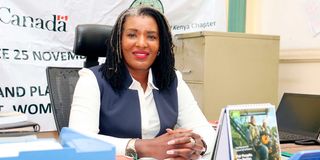From classroom tears to courtroom triumph: Hellen Onkwani's journey against GBV

Makadara Law Courts Senior Principal Magistrate Hellen Onkwani during an interview at Makadara Law Courts in Nairobi on December 4, 2024.
What you need to know:
- Senior Principal Magistrate Hellen Onkwani, who once faced discrimination for academic excellence, has become a fierce defender of gender justice at Makadara Law Courts.
- Known for her swift convictions, including sentencing a child defiler to life imprisonment in just 10 days, she handles about 50 cases daily with nearly a third involving GBV.
- Beyond delivering justice, she advocates for victim restitution reforms while serving as secretary of the International Association of Women Judges - Kenya Chapter.
On Wednesday morning in the halls of Makadara Law Courts, women, and men are squeezed against one another, with children peeping through the dark human canopy.
With their palms on their cheeks, hopelessly leaning against the walls, they wait in line for their turn to accompany the children who will testify and hear experts give witness.
Typically, this is the day when the magistrate's court hears defilement cases.
Sitting in the Makadara Magistrate Court is Hellen Onkwani, Senior Principal Magistrate, whose presence brings hope to the violated and trepidation to the accused.
She takes no prisoners when it comes to cases of gender-based violence (GBV), especially those involving children.
In 2022, she made a decision in just 10 days, sentencing a man to life imprisonment for defiling a three-year-old girl after he pleaded guilty.
While this is the minimum sentence stipulated in the Sexual Offences Act (2006), Hellen believes that the punishment is too centred on the accused, neglecting the victim’s need for restoration.
“Minimum sentencing, in my opinion, is not enough. Because once you finalise the case, read the judgment, and the conviction and sentence are given—be it life imprisonment, 20 years, or 15 years—what happens to the victim?
“The majority, especially those who are 12 years and above, often find themselves pregnant and become parents. So, at the end of the day, they carry that trauma for the rest of their lives.”
Hellen is part of the case types committee formed by the Chief Registrar of the Judiciary, which has recommended a civil aspect in GBV cases.
“That the court can then proceed to convene as a civil court and determine the kind of restitution the victim can receive. What we have realised is that once the accused has been convicted, that is the end of the story,” she asserts.
Hellen’s journey into the judiciary began in 2010 when she took on the role of District Magistrate.
“It was a path I never envisioned for myself,” she reminisces, reflecting on her journey from Nyansiongo, a rural village in Nyamira County.
An incident in her childhood during primary school sharply charted her career path—a school prefect struck her for achieving a perfect score, simply because she was a girl.

Hellen's passion for justice was ignited in childhood when she was punished for scoring full marks simply because she was a girl.
She returned home in tears and asked her father whether it was wrong for a girl to score 100 per cent in any subject. He assured her there was nothing wrong with that.
“I felt it was inhumane for anyone to discriminate against another for scoring 100 per cent. From that moment, I decided I wanted to be a lawyer,” she states.
“But I didn't know I would end up in court. Becoming a magistrate presented an opportunity for me.”
However, the pathway to her esteemed position is as intricate as the cases she adjudicates.
Promoted every three to five years—depending on available resources and performance—Hellen describes the rigours of the Judicial Service Commission’s interview process.
“You must present your caseload, your integrity, and even your character,” she notes, her brow furrowing slightly.
“Each court is evaluated based on its workload. Here in Makadara, the cases are unrelenting—an average of 50 matters daily.”
The volume of cases she handles encompasses everything from fraud to gender-based violence (GBV), and the stakes couldn’t be higher.
Hellen’s voice grows sombre as she delves into the specifics of her work, particularly the sensitive cases involving children and GBV.
“In a typical day, we may work on cases that tear at the very fabric of our humanity—cases involving young children who have been defiled or abused,” she explains, her eyes reflecting both the weight of her profession and the fragile hope for justice.
“It’s heart-wrenching. You can see it in their eyes; the trauma lingers far beyond the courtroom.”
Creating a child-friendly environment where these innocent voices can be heard is essential to her role.
“When you’re dealing with a five-year-old who has been defiled, you must be the protector in the room. We often have to clear the court of extraneous individuals, ensuring a safe space,” she adds.
“Children are terrified; they don’t want to relive their trauma in front of their perpetrator.”
Performance statistics reveal an unsettling truth. Of the numerous cases Hellen handles daily, around 30 per cent involve GBV—underscoring the urgency of her work.
“It’s crucial to prioritise these cases, especially when the victims are children who should be in school, not in court,” she states emphatically.
Her commitment to protecting survivors shines through her words: “For those children, justice cannot wait; time is not a luxury they possess.”
Behind the scenes, however, the judicial system often feels like a complicated and slow-moving machine.
“Sometimes cases roll over for years due to untraceable witnesses or lack of police support,” she shares.
“And while we have made strides in establishing gender justice courts aimed at expediting these cases, resources remain scarce.”
Hellen’s passion extends beyond the courtroom walls; she serves as the secretary of the International Association for Women Judges - Kenya Chapter (IAWJ-KC), advocating for change in how SGBV cases are approached in Kenya.
“We have initiated specialised courts to handle these matters efficiently,” she reveals.
“It’s all about ensuring that victims can find peace and move on with their lives.”
During this year’s 16 Days of Activism against GBV, the association has undertaken various activities to raise awareness about ending these crimes, including sensitisation drives at Kibera and Vihiga Law Courts, as well as participation in radio and TV talk shows.
“We have the statistics; they indicate that every 11 minutes a woman is killed, raped, or defiled, or a child is defiled. The activities we have conducted aim to sensitise the community because we have realised that without enlightening the public on the wrongness of violating a child, woman, or boy, such crimes will persist,” she explains.
Yet her work comes with the burden of disturbing experiences.
“We become traumatised when handling GBV cases, and it’s vital to look after yourself. You need to engage in a church that allows you to believe in God or find a sport that you enjoy,” she says.
“I’m a golfer. When I hit the ball, I forget about all the trauma from these courts.”
The Judiciary and IAWJ-KC also provide much-needed psychosocial support for judicial officers.
“We have debriefing sessions for the magistrates who handle GBV cases,” she notes.
“But the judiciary also has a department dedicated to psychosocial support for anyone feeling traumatised.”
Now, as she navigates her role in the judiciary, Hellen emerges as not just a magistrate but a beacon of hope—a woman who embodies resilience, strength, and unwavering dedication to justice.
“It may not be an easy path,” she concludes, “but if my journey can inspire even one girl from my village to dream big, then it’s all worth it.”





